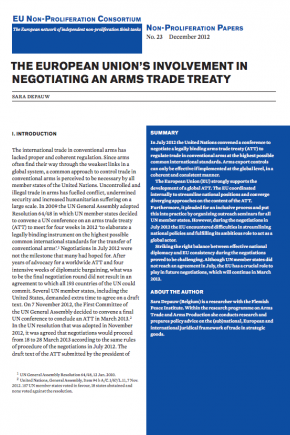The European Union's Involvement in Negotiating an Arms Trade Treaty
In July 2012 the United Nations convened a conference to negotiate a legally binding arms trade treaty (ATT) to regulate trade in conventional arms at the highest possible common international standards. Arms export controls can only be effective if implemented at the global level, in a coherent and consistent manner. The European Union (EU) strongly supports the development of a global ATT. The EU coordinated internally to streamline national positions and converge diverging approaches on the content of the ATT. Furthermore, it pleaded for an inclusive process and put this into practice by organizing outreach seminars for all UN member states. However, during the negotiations in July 2012 the EU encountered difficulties in streamlining national policies and fulfilling its ambitious role to act as a global actor. Striking the right balance between effective national diplomacy and EU consistency during the negotiations proved to be challenging. Although UN member states did not reach an agreement in July, the EU has a crucial role to play in future negotiations, which will continue in March 2013.

